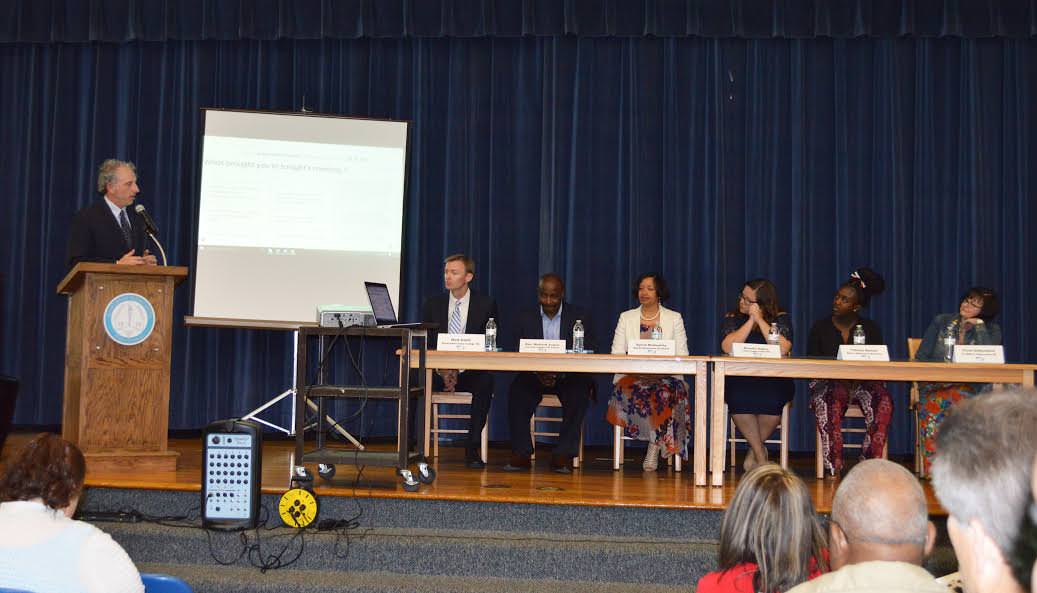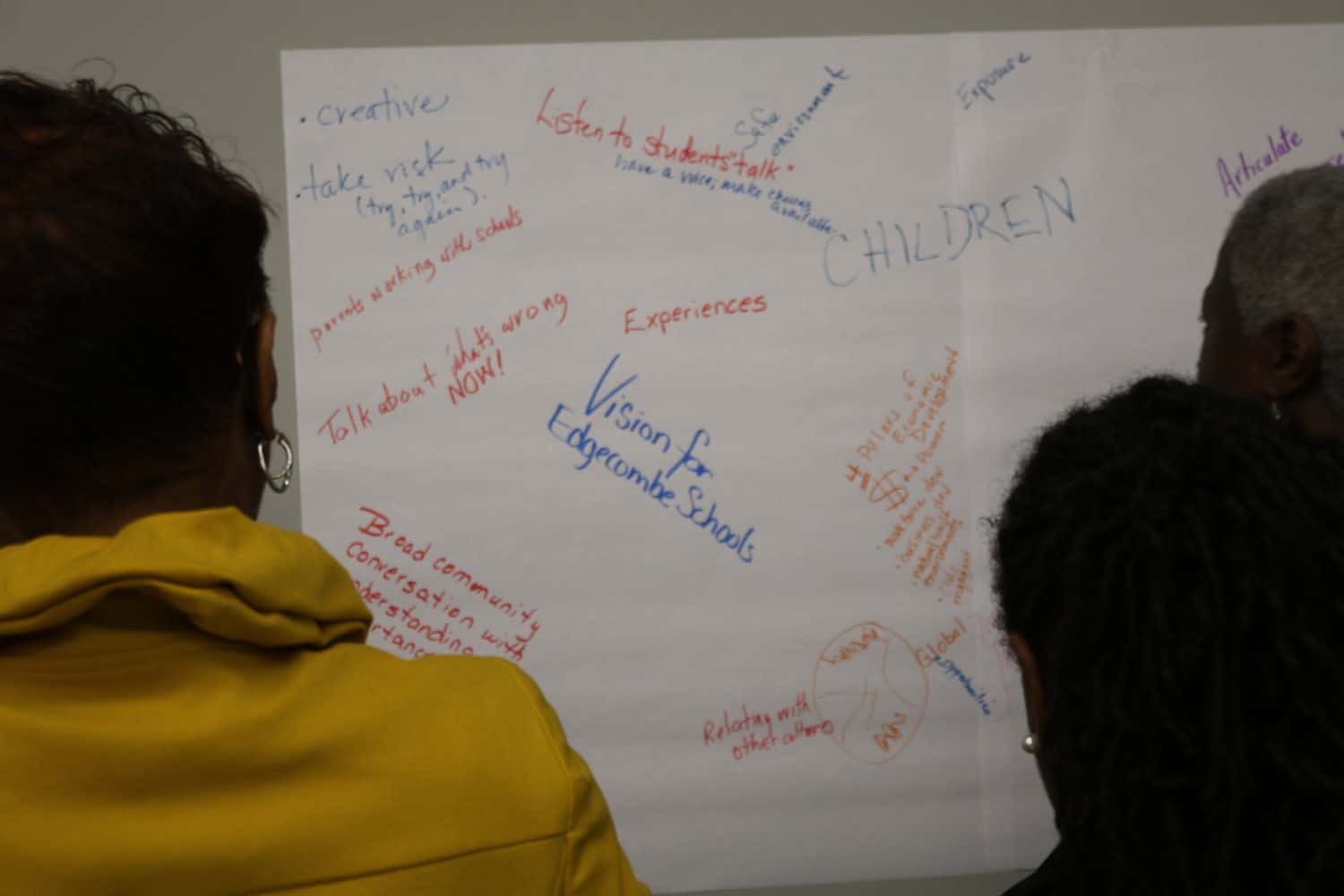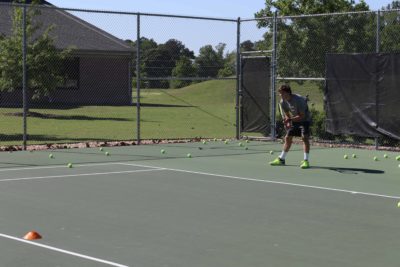Over the past few months, Edgecombe County Public Schools administration has asked the community a question: What do you want for the children of Edgecombe County?
Last week, the Blue Ribbon Commission on Educational Equity hosted its last town-hall style meeting for the school year, exploring that question. The commission is made up of principals, local lawmakers, school board members, students, and parents, and has invited the public to meetings to discuss how to address issues the school system is facing and prepare students for successful futures.
The topics of discussion have been broad — educational equity, human capital, and, most recently, educating the whole child. Superintendent John Farrelly said they have opened up useful dialogue.
“These are conversations that not a lot of school systems want to have about real issues,” Farrelly said. “(It’s about) kind of unearthing some things, and then looking at what are our targets and how are we going to problem-solve to get to where we want to be.”
The input they received will be used in creating a systemwide strategic plan. Farrelly, who came to the district five years ago, made significant changes in the county’s schools, which serve a high-poverty and majority-minority student population.
“We have made a lot of strides in this school district in a lot of ways, particularly in the last two years especially, and we’re trending up,” Farrelly said. “But if we’re going to go from good to great eventually, then there are some things that we’ve got to talk about as a community, talk about as citizens, and then try to transform and lead change efforts.”


For the last meeting this school year, held at Southwest Edgecombe High School, the commission and public tackled what it means to educate the whole child — how to acknowledge students’ needs beyond the classroom and meet them. This strategy, which was adopted by the State Board of Education last fall, recognizes the effects students’ mental and emotional states have on their ability to learn and encourages partnerships between school systems, healthcare providers, and community organizations. Farrelly said it was an appropriate way to end this year’s commission meetings, since their whole purpose was to partner with the community to better serve students.
“Part of the conversation around tonight is embracing the community and everyone in the community plays a part,” Farrelly said. “We’re out here to get real feedback and then do something about it.”
Teachers, community leaders, and students created a panel and shared stories on how they have seen students flourish because someone in their lives went the extra mile to meet their complex needs.
Vivian Edmondson, the career development coordinator at Southwest, talked about a student she called Little Bit. From an early age, Edmondson realized the student was distant, rarely smiled, and, during one especially hard winter, kept showing up to school with no coat.
After reminding Little Bit to bring a coat to school daily with no results, Edmondson finally had a private conversation with her and found out she didn’t own a winter coat. Edmondson bought her one.
“A few days after this, Little Bit came by to see me, and she opened up to me and told me about her family,” Edmondson said. She learned the student’s family was homeless and living in a hotel in Rocky Mount. She was one of five siblings with another on the way. The family lacked reliable transportation, which caused Little Bit to be frequently absent from school.
Edmondson worked with the school’s counselor and social worker to figure out the transportation issue. For the next years, Edmondson became Little Bit’s advocate and supported her in any way that she could. With help from her church’s congregation, she provided Christmas presents for her entire family one year. Edmondson and her husband delivered the gifts to the hotel.
“I can tell you it was truly an eye-opening experience to walk into a hotel room that housed eight people, two double beds in the hotel room, all their earthly possessions in boxes sitting in every nook and cranny in that hotel room,” Edmondson said. “It amazed me that the student could even function at school let alone take the more rigorous courses. It was heartbreaking.”
Edmondson and other faculty worked to find permanent housing for the family and funded appliances and furniture for the home. Edmondson found a Pine Tops dentist that fixed serious dental needs for Little Bit, free of charge. And when the student became pregnant her senior year, Edmondson said she witnessed resilience and responsibility as Little Bit accepted the reality, made a plan for the future, and stayed in school.
Participants shared story after story like Edmonson’s.
“Every curriculum, ever single interaction between a student and a teacher, is more powerful, more potent, more effective, when there’s a strong, caring, supportive relationship between the two,” said Matt Smith, principal of Edgecombe Early College High School.
Panelists emphasized the importance of creating relationships with students’ parents and always keeping the school doors open. Reverend Richard Joyner, the founder of the Conetoe Family Life Center, spoke on the value of connecting the school system with community organizations. Joyner goes into Edgecombe schools and educates students on beekeeping, farming, nutrition, and sustainability. He views part of his role as supporting and educating children outside the classroom. Each panelist focused on creating special connections with children that struggle.
“When students feel — not when they know — when they feel, at a visceral level, that you care about them, that you know them, that you love them,” Smith said, “that can make the difference between success and failure.”



